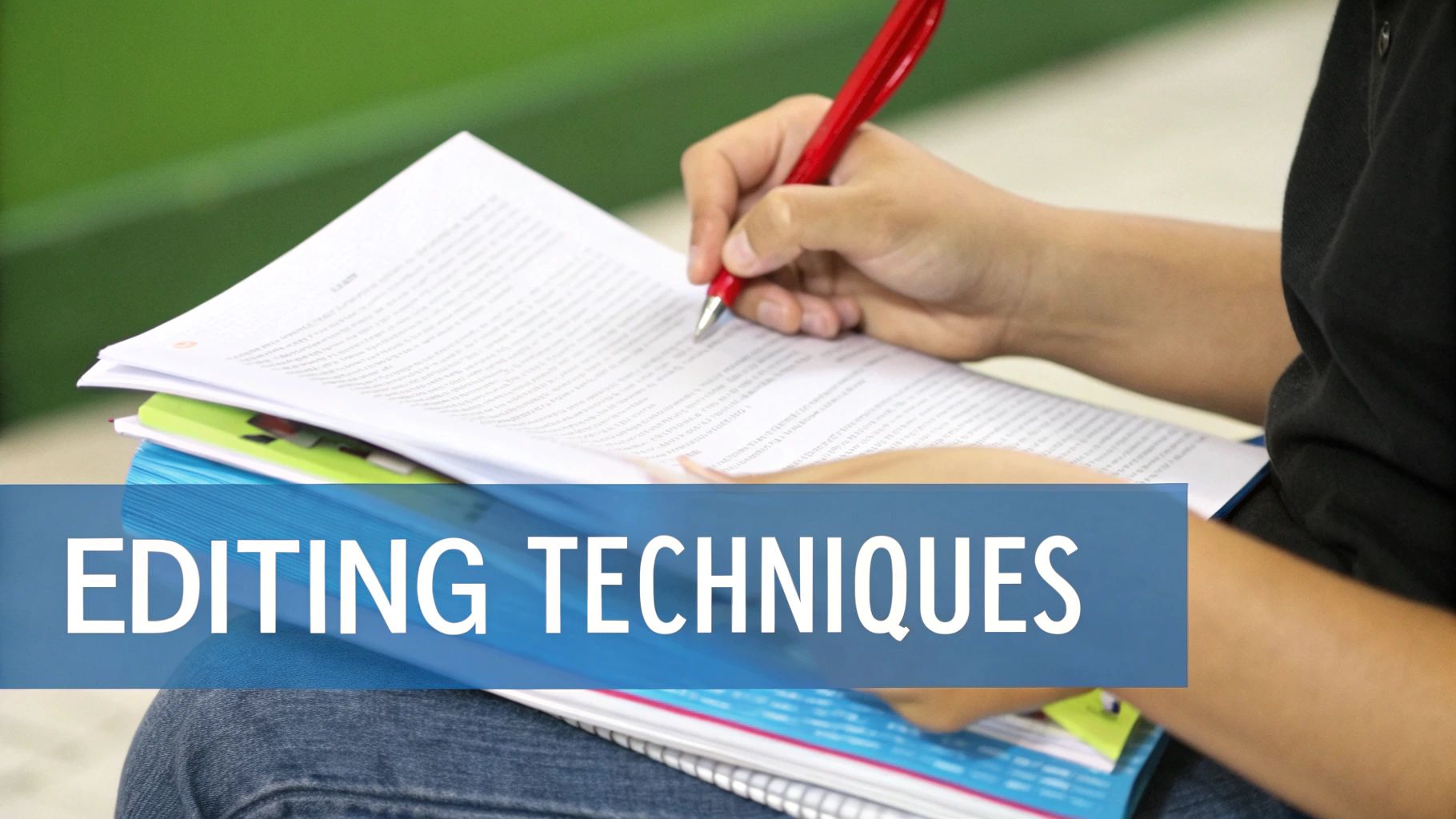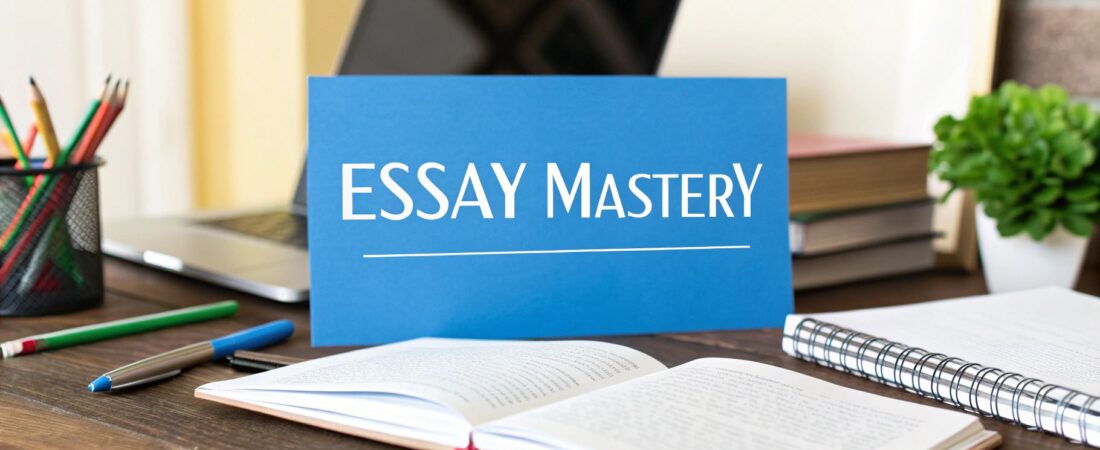Breaking Through the Essay Writing Block
Most students find essay writing to be a significant challenge. Moving from a blank page to a complete essay requires combining critical thinking, sustained focus, and effective time management – skills that many students are still developing. This often leads to putting off the work, feeling anxious, and ending up with rushed, lower-quality essays. The first step to overcoming this "essay writing block" is understanding what causes it.
Understanding the Root of the Problem
One key issue is the gap between how well students think they can write versus their actual writing abilities. Research shows that students frequently overestimate their essay writing skills. This overconfidence can lead them to underprepare and scramble to finish assignments at the last minute. Many also focus too much on surface-level elements like grammar while neglecting core aspects like developing clear arguments and connecting ideas logically. This is similar to carefully decorating a cake without properly baking it first – the end result won't be satisfying. For instance, a student might spend hours perfecting individual sentences but fail to create a clear flow of ideas throughout their essay.
Practical Strategies for Overcoming the Block
To write better essays, students can break down the writing process into smaller, manageable steps. Think of it like training for a marathon – you wouldn't try running the full distance on day one. Instead, you build up gradually over time. The same approach works for essays: start with brainstorming, create an outline, do research, write a first draft, then revise and edit. Taking it step by step helps build confidence and momentum while making the overall task feel less overwhelming.
Utilizing Digital Tools to Your Advantage
Technology can make the essay writing process much smoother. Grammarly and other writing tools assist with everything from coming up with topics to checking grammar and citations. Mind mapping software helps organize thoughts and connect related concepts visually. Online research databases like Google Scholar provide quick access to reliable sources. These tools handle many technical aspects so students can focus more on developing strong arguments and writing compelling content.
Embracing Imperfection and Seeking Feedback
It's essential to remember that first drafts don't need to be perfect. Trying to write a flawless essay from the start often prevents students from even beginning. Instead, focus on getting your ideas down first, then improve through multiple revisions. Getting feedback from classmates and teachers provides valuable outside perspective on areas needing work. Writing skills develop through practice – each essay is a chance to learn and improve. View the process as ongoing development rather than trying to achieve perfection immediately.
Crafting Your Unique Writing Framework
Writing an essay is like building a house – you need the right tools and structure to create something solid. While we've explored ways to overcome writer's block, now it's time to focus on developing your own personalized writing system. Instead of trying to force yourself into rigid templates that don't match your style, let's look at how successful students build flexible frameworks that work with their natural writing process.
Building a Flexible and Adaptable System
The first step is understanding your strengths and preferences as a writer. Are you someone who needs a detailed outline before starting, or do you discover your ideas through free writing? Do you excel at research and analysis, or is storytelling more your strength? Once you identify these tendencies, you can create a system that plays to your abilities. For example, if brainstorming is challenging, try incorporating mind mapping to generate and connect ideas. If traditional outlines feel constraining, experiment with more fluid planning methods. The key is building a framework that can adapt to different types of essays while maintaining consistent quality.
Organizing Your Thoughts Effectively
Good organization is essential for writing clear, compelling essays. Beyond just logically structuring arguments, you need a reliable system for managing information and creating smooth transitions between ideas. While traditional outlines work well for some, consider trying visual methods like mind mapping to see connections between concepts in a new way. Digital tools can also make planning more efficient by letting you easily reorganize sections and keep track of research. Check out our guide on How to master essay writing with SmartStudi's tools to learn more about using technology to support your writing process.
Developing Strong Thesis Statements and Argument Coherence

A clear thesis statement serves as the foundation for your entire essay. This central claim guides both the writing process and the reader's understanding. Research shows that 23% of education students struggle with maintaining coherence in their essays – making sure each paragraph builds logically on the previous one to support the main argument. To keep your essay focused, regularly check that each section connects back to your thesis. Think of your thesis as a roadmap showing where the essay is headed. Use clear transitions between paragraphs, just as a building needs proper connections between its structural elements. When all the pieces work together smoothly, you create a unified and persuasive argument that keeps readers engaged from start to finish.
Making Research Work for You
A strong essay needs solid research at its core. While many students find research overwhelming, it doesn't have to be a tedious task. By approaching research as an opportunity to explore new ideas and deepen your understanding, you can turn it into an enriching part of the writing process. This section will show you practical ways to make research work effectively for your essays.
Efficiently Gathering and Organizing Evidence
Good research isn't about collecting huge amounts of information – it's about finding relevant sources and organizing them well. Start by mapping out your topic's key concepts and keywords, just as you'd create a blueprint before building. Use these keywords to search academic databases, libraries, and reliable online sources. As you collect information, keep careful track of your sources. Staying organized from the beginning makes the writing process much smoother later on.
Practical Approaches to Note-Taking
Taking good notes helps you understand and remember what you read. Rather than just highlighting passages, try active note-taking methods that make you think about the material. Summarize key points in your own words or create visual maps showing how different ideas connect. These techniques help you engage more deeply with the sources. Consider using digital tools to organize and search your notes easily, giving you more time to focus on developing your arguments. For help with citations, check out: How to master citations with SmartStudi.
Integrating Sources Smoothly Into Your Writing
After gathering research, you need to blend it naturally into your essay. Think of your sources as supporting evidence that strengthens your points without taking over your paper. Introduce each source clearly, explain why it matters for your argument, and analyze what it means. Instead of long quotes that break up your writing, try paraphrasing and summarizing when possible. Only use direct quotes when the exact wording is essential. The goal is to use research to support and develop your own ideas, not just repeat what others have said.
Identifying Credible Sources and Avoiding Citation Pitfalls
You need to evaluate sources carefully to find reliable information. Focus on academic journals, books, and established organizations while being cautious of biased or unsupported claims online. Make sure you understand the required citation format and double-check your citations to avoid errors that could hurt your grade. Using research effectively means finding trustworthy sources and citing them properly. When you master these research skills, you'll write stronger essays that present well-supported arguments.
Developing Your Academic Voice

Academic writing requires finding the right balance between formal requirements and your individual perspective. The best academic writing combines clear, professional language with your unique insights and analysis. This section explores practical ways to develop your academic voice while still meeting scholarly standards. You'll learn techniques to make your essays more engaging and impactful without sacrificing academic rigor.
Finding the Sweet Spot Between Formal and Authentic
Many students make the mistake of using overly complex language in an attempt to sound more scholarly. This often leads to unclear writing that masks their actual ideas. Instead of forcing complicated vocabulary, focus on expressing your thoughts with precision and clarity. Think of it like dressing professionally – you want to look polished while still feeling comfortable and true to yourself. Your academic writing should follow a similar principle: maintain high standards while letting your natural voice shine through.
Engaging Your Reader Through Style and Substance
Creating compelling academic writing involves more than avoiding complicated jargon. You need to structure your arguments in ways that guide readers smoothly through your reasoning. Mix up your sentence patterns – use short, direct statements for key points and longer sentences to explore complex ideas in detail. Adding specific examples helps make abstract concepts more concrete and memorable for readers. The goal is to keep your audience interested while clearly communicating your insights.
Practical Techniques for Enhancing Your Writing
Improving your academic voice takes dedicated practice. One effective method is studying successful academic papers and essays. Notice how they build arguments, incorporate evidence, and maintain consistent tones. Pay attention to both the content and writing style. Getting feedback from others on your work is also essential. Outside perspectives can spot places where your voice gets lost or your arguments need strengthening. Regular practice and thoughtful revision will help you develop writing that is both scholarly and engaging.
Building Confidence in Your Academic Expression
Developing your academic voice is an ongoing process. Each writing assignment is a chance to practice new techniques and find what works best for your style. Don't be afraid to try different approaches. The more you write, the more naturally your unique voice will emerge in your work. Focus on expressing your ideas clearly and confidently while maintaining academic standards. With time and practice, you'll find the right balance between formal writing and your authentic perspective.
Mastering the Art of Revision

After completing your first draft, the journey to a stronger essay continues with the essential process of revision. This goes beyond simply correcting typos; it's an opportunity to refine your arguments, bolster your evidence, and create a seamless, logical flow from introduction to conclusion. Think of your first draft as the foundation, and revision as the process of building a polished, well-crafted structure upon it.
Systematic Approaches to Editing
Effective revision requires a methodical approach. Skimming your essay randomly won't uncover all potential areas for improvement. Instead, consider these focused strategies:
- Thesis Check: Begin by ensuring every paragraph directly supports your central argument. If a section seems unrelated, rework it to align with your thesis, or consider removing it altogether. A cohesive argument is crucial for a compelling essay.
- Argument Evaluation: Next, examine the strength of your claims. Are they supported by sufficient evidence? Just as a building requires sturdy supports, your arguments need convincing proof. This might involve adding more research, strengthening existing examples, or clarifying the link between evidence and claims. A well-supported argument is a persuasive argument.
- Structural Review: Finally, evaluate the essay's overall structure. Does the argument progress logically from one point to the next? A disorganized structure can confuse the reader. Ensure your essay's organization guides the reader smoothly through your ideas, using clear transitions and topic sentences to connect each paragraph.
Improving Clarity and Flow
Clarity and flow are vital components of effective writing. Even the most insightful ideas can lose their impact if not presented clearly. Here are some practical techniques to enhance both:
- Sentence Variety: Avoid monotony by varying your sentence structure and length. Short, impactful sentences can emphasize key points, while longer sentences provide space for more nuanced explanations. This balance keeps the reader engaged.
- Transitional Phrases: Use transitional words and phrases like "Furthermore," "However," "In contrast," and "For example" to guide your reader between ideas. These transitions act as bridges, connecting your thoughts and creating a smooth reading experience.
- Paragraph Cohesion: Focus each paragraph on a single, well-defined idea. Begin with a clear topic sentence that introduces the main point. Then, develop that idea with supporting details and examples. Conclude the paragraph with a sentence that naturally segues into the next topic, maintaining the flow of your argument. For further guidance on grammar and clarity, you might be interested in: How to master grammar and clarity.
Utilizing Peer Review and Feedback
Self-revision is crucial, but incorporating feedback from others can greatly enhance your essay. A fresh perspective can identify errors you might have overlooked and offer valuable insights on making your arguments more persuasive.
- Peer Review: Exchange essays with a classmate and offer constructive criticism on each other's work. Focus on identifying areas where arguments could be clearer, evidence stronger, or the flow improved. This reciprocal process benefits both writers.
- Instructor Feedback: Actively seek and utilize feedback from your instructor. View feedback not as criticism, but as a valuable opportunity for growth and improvement. Carefully consider their suggestions and revise your essay accordingly.
Refining Your Final Draft
After incorporating feedback and completing necessary revisions, dedicate time to polishing your final draft. This includes meticulous proofreading for any lingering errors in grammar, spelling, and punctuation. Reading your essay aloud can help identify awkward phrasing and ensure a smooth flow. Remember, even minor errors can detract from your essay's overall impact. Through diligent revision and careful attention to detail, you can transform your initial draft into a polished and persuasive piece of writing that effectively showcases your ideas.
Building Long-Term Writing Success

Essay writing excellence requires dedicated, ongoing practice. Just as athletes commit to regular training to improve their performance, writers must develop sustainable habits to consistently produce high-quality work. Let's explore practical strategies that successful students use to build their writing skills over time.
Creating a Realistic Writing Schedule
Many students struggle with procrastination and underestimate how long quality writing takes. The solution is breaking down large assignments into smaller, focused tasks with dedicated time blocks. Rather than attempting to write an entire essay at once, set aside specific periods for each phase – perhaps one evening for outlining, another for research, and several shorter sessions for writing and revising. This approach prevents overwhelm and allows you to give each step proper attention. Short, regular writing sessions tend to be more productive than sporadic marathon efforts.
Establishing Effective Editing Routines
Strong editing separates good essays from great ones, yet it's an often-rushed step. Take a deliberate approach by stepping away from your draft before reviewing it with fresh perspective. Read your work aloud to catch awkward phrasing and flow issues. Create a checklist of common errors to systematically review clarity, coherence, and argument strength. This structured editing process helps ensure no critical issues slip through.
Building a Personal Library of Writing Resources
Having key references readily available saves valuable time when writing questions arise. Collect style guides, grammar handbooks, dictionaries, and examples of successful essays in one accessible place. Keep copies of your own best work as well – reviewing past essays helps you recognize patterns in your writing style and identify both strengths to build on and areas needing improvement.
Managing Multiple Assignments and Continuous Improvement
When juggling several writing tasks, prioritize based on deadlines and complexity. Break each assignment into clear steps and add them to your schedule. This maintains steady progress across all projects. Make time to reflect on your writing process and actively seek feedback from instructors and peers. Try new techniques to expand your capabilities. With dedication to sustainable habits and ongoing learning, essay writing becomes an opportunity for intellectual growth rather than a source of stress.
Ready to supercharge your essay writing? SmartStudi offers AI-powered tools designed to help you research, write, and cite with confidence. From AI detectors and paraphrasers to essay generators and grammar checkers, SmartStudi provides the support you need to achieve your academic goals. Visit SmartStudi today and discover how we can help you succeed.
